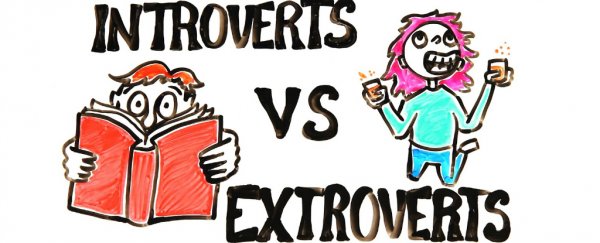There are a lot of ways to define ourselves these days, but popular psychology generally lumps people into one of two broad personality types - introverts or extroverts. But how much science is actually behind this distinction, and, from an evolutionary perspective, which one's better?
The team from AsapSCIENCE is here to break down the evidence, and it turns out there's quite a lot of research that shows there really is a divide between the way introverts and extroverts think and feel - it's definitely not all in your head.
For a bit of backstory, the terms 'introvert' and 'extrovert' were first coined by psychologist Carl Jung in the early 1900s, but it was psychologist Hans Eysenck who further elaborated on them in the 1950s and '60s.
Basically, Eysenck described extroverts and introverts by their base line of arousal - introverts need a lot less stimulation to become satisfied, whereas extroverts need a little more excitement.
For example, while an introvert might be content with a leisurely bike ride through the park, an extrovert might want to go off-road to get enjoyment.
Since then, brain scans have shown physical evidence to back this up. Research has found thicker prefrontal cortices in introverts as compared to extroverts, which is associated with deeper thought and planning - suggesting that introverts are less impulsive than extroverts.
That can be a good thing, but it can also make introverts more prone to anxiety and depression.
And neurological research has also shown that extroverts respond more strongly to rewards than introverts, with the feel-good hormone dopamine being activated more strongly when extroverts win gambling tasks, as compared to introverts.
Extroverts also have more dopamine activation when they connect with other humans - which isn't to say that introverts don't like winning or being around people, it simply means that human contact and the thrill of the win has more of an influence on extroverts than introverts.
Or, in other words, introverts don't require as much social interaction in order to feel good as extroverts do.
This isn't all just personality based, either. Genetic studies have shown that there are certain genetic changes and alleles linked to particular traits associated with extroversion, such as being adventurous.
But which one is better? Well, from an evolutionary point of view, both introverts and extroverts would have had a competitive advantage in hunter-gatherer days, with less impulsive introverts more likely to stay alive, and adventurous extroverts more likely to stumble into a new source of food or water.
Today, though, there are more clear advantages and disadvantages to each personality type, especially because modern society, education systems, and workplaces all display a very strong extroversion bias - we're rewarded for putting ourselves out there and working enthusiastically in teams.
Despite that, research suggests that there might be a clear winner when it comes to social success, and it's not introverts or extroverts, but rather a new type of personality group called ambiverts - those people who sit right in the middle of the spectrum.
We'll let the video above explain that one to you, but the bottom line is there are plenty of reasons to celebrate and embrace your personality type, no matter what it is. So check out the video and figure out which one you are.
